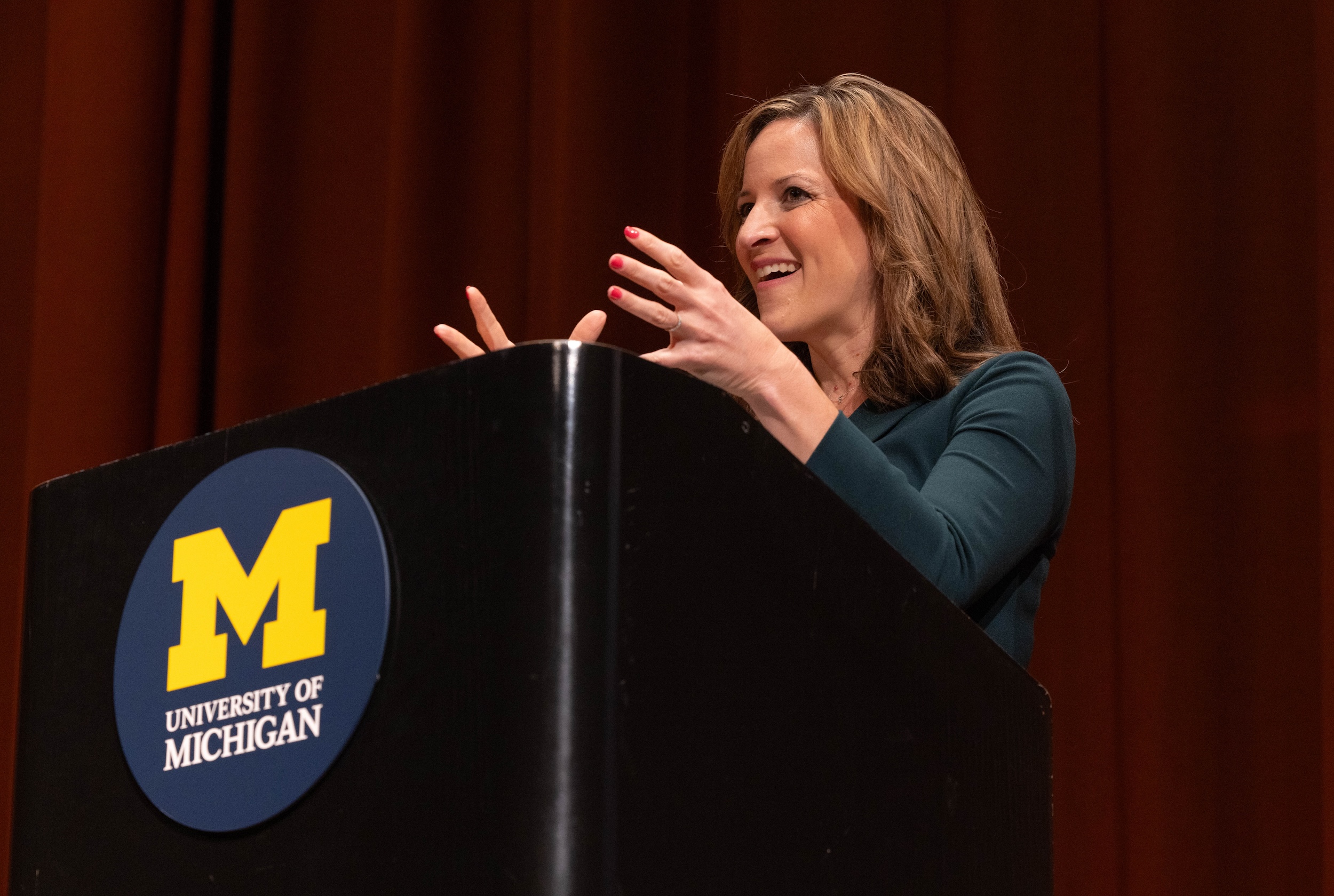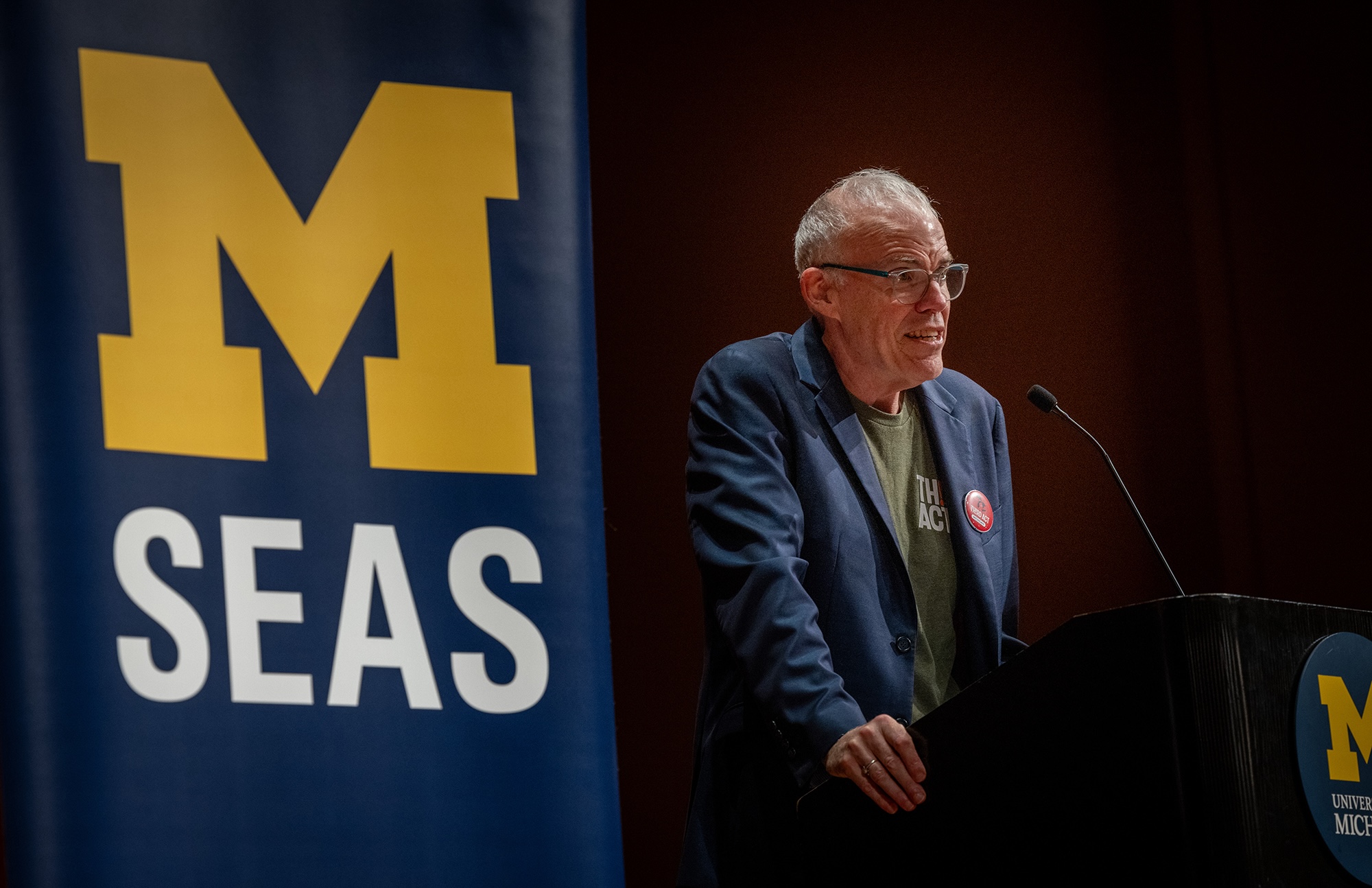
 back to all news
back to all news
Michigan Climate Action Network's annual summit explored civic engagement, social justice and climate action

The Michigan Climate Action Network (MiCAN) Summit, hosted by the University of Michigan School for Environment and Sustainability (SEAS), took place September 26, 2024, on U-M's Ann Arbor campus. Featuring keynotes from author, educator and environmentalist Bill McKibben and Michigan Secretary of State Jocelyn Benson, the event brought together more than 1,000 people to explore the intersections between civic engagement, social justice and climate action.
Guided by the theme “climate civics,” the summit’s schedule featured nearly 100 panelists and presenters including SEAS Dean Jonathan Overpeck and U-M’s first Vice Provost for Sustainability and Climate Action and SEAS Professor Shalanda Baker.
When Benson took the stage, it was with Melanie Ryska, Sterling Heights City Clerk, and Jackie Beaudry, Ann Arbor City Clerk. They discussed all the work that goes into ensuring that every voter knows the power of their vote, and how to exercise their right to vote.
“One of our jobs, our responsibilities, as team democracy in the weeks ahead, is to make sure citizens know two things—the power of their vote, and how to exercise it,” said Benson. “So what we’re going to talk about today is that second part, but what you already know, is that first part, the power of your vote to define our future, and how important it is that we help everyone be informed and engaged in this moment with trusted information about what’s on the ballot and about the impact of their vote.”

Before beginning the panel discussion, Benson emphasized the importance of maintaining the trust and integrity of the voting process and debunking misinformation.
“We need your help to tell our story so that folks know that their clerks are trusted sources of information and that citizens can be proud of our elections in this state, and really, in every state, but especially in Michigan, because we do so much every day to ensure, no matter who someone votes for, that they can trust the integrity of the process, and so your job will be to be those ambassadors for truth. To not spread misinformation, but debunk it, prebunk it,” said Benson.
McKibben, who gave the closing keynote address, acknowledged how much progress has been made in addressing climate change since he wrote his first book in 1989, widely regarded as the first book about climate change written for a general audience.
He said that, while he acknowledges the progress, there’s still much to do to halt the worst effects of climate warming, citing data from scientists that shows recent temperatures were the hottest to be recorded on the planet.
“You’re living on a hotter planet than humans have ever lived on,” said McKibben. “And since last year, every month has broken the monthly record for the hottest month, and we’ve smashed those records already for the hottest days ever recorded on this Earth, and the consequences have been exactly 100% what every scientist was warning about a very long time ago and we’ve watched it come true.”

McKibben cited the extraordinary rates of ice melting in the north and south poles and the resulting change in the ocean currents causing indescribable consequences. He also discussed the effects of wildfires, droughts and extreme rain events causing flooding. McKibben emphasized that we’re in the beginning stages of experiencing the impacts of these events.
“The scary part is, we’re still in the early stages of this, and we’re on a trajectory right now, that if we don’t interrupt it quickly, we’ll raise the temperature about three degrees Celsius by the time the youngest people in this room are my age,” said McKibben, adding that this amount of warming would cause big problems with climate refugees in need of moving to a habitable part of the planet.
McKibben said that it’s too late to stop global warming and that the most important thing now is to stop it short such that civilization can continue to survive.
“Here’s the real kicker,” said McKibben. “If we're going to do it, we have to do it fast, otherwise it doesn’t count.”
At several points in his talk, McKibben emphasized the importance of the upcoming elections, saying that they are the most consequential and will determine whether the U.S. does or does not stay on the right track to meet essential climate targets.
“If we don’t win this soon, we don’t win, and that’s why we’re all in and why we need to be all in, why we need to get as many people as is humanly possible out of their comfort zone and working hard because our planet is so far outside its comfort zone,” said McKibben.
Other highlights of the summit included discussions on how to build effective campaigns; being an advocate for climate change; the role of media in climate democracy; and how to empower communities. Outside of the summit venues, attendees had the opportunity to participate in a variety of sustainability-related activities, such as contributing to an art installation, mingling with sponsors and walking through campus to learn about sustainability initiatives at U-M’s annual Earthfest.

